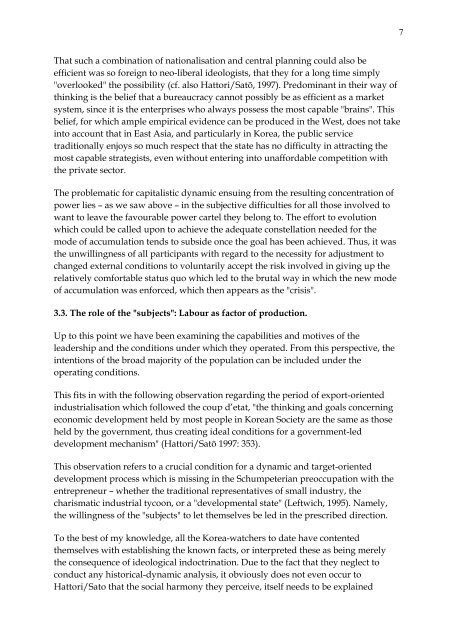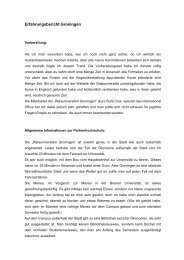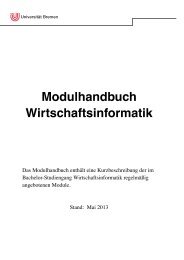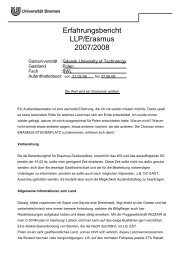Holger Heide Schumpeterian Dynamics in Crisis - Universität Bremen
Holger Heide Schumpeterian Dynamics in Crisis - Universität Bremen
Holger Heide Schumpeterian Dynamics in Crisis - Universität Bremen
You also want an ePaper? Increase the reach of your titles
YUMPU automatically turns print PDFs into web optimized ePapers that Google loves.
7<br />
That such a comb<strong>in</strong>ation of nationalisation and central plann<strong>in</strong>g could also be<br />
efficient was so foreign to neo-liberal ideologists, that they for a long time simply<br />
"overlooked" the possibility (cf. also Hattori/Satõ, 1997). Predom<strong>in</strong>ant <strong>in</strong> their way of<br />
th<strong>in</strong>k<strong>in</strong>g is the belief that a bureaucracy cannot possibly be as efficient as a market<br />
system, s<strong>in</strong>ce it is the enterprises who always possess the most capable "bra<strong>in</strong>s". This<br />
belief, for which ample empirical evidence can be produced <strong>in</strong> the West, does not take<br />
<strong>in</strong>to account that <strong>in</strong> East Asia, and particularly <strong>in</strong> Korea, the public service<br />
traditionally enjoys so much respect that the state has no difficulty <strong>in</strong> attract<strong>in</strong>g the<br />
most capable strategists, even without enter<strong>in</strong>g <strong>in</strong>to unaffordable competition with<br />
the private sector.<br />
The problematic for capitalistic dynamic ensu<strong>in</strong>g from the result<strong>in</strong>g concentration of<br />
power lies – as we saw above – <strong>in</strong> the subjective difficulties for all those <strong>in</strong>volved to<br />
want to leave the favourable power cartel they belong to. The effort to evolution<br />
which could be called upon to achieve the adequate constellation needed for the<br />
mode of accumulation tends to subside once the goal has been achieved. Thus, it was<br />
the unwill<strong>in</strong>gness of all participants with regard to the necessity for adjustment to<br />
changed external conditions to voluntarily accept the risk <strong>in</strong>volved <strong>in</strong> giv<strong>in</strong>g up the<br />
relatively comfortable status quo which led to the brutal way <strong>in</strong> which the new mode<br />
of accumulation was enforced, which then appears as the "crisis".<br />
3.3. The role of the "subjects": Labour as factor of production.<br />
Up to this po<strong>in</strong>t we have been exam<strong>in</strong><strong>in</strong>g the capabilities and motives of the<br />
leadership and the conditions under which they operated. From this perspective, the<br />
<strong>in</strong>tentions of the broad majority of the population can be <strong>in</strong>cluded under the<br />
operat<strong>in</strong>g conditions.<br />
This fits <strong>in</strong> with the follow<strong>in</strong>g observation regard<strong>in</strong>g the period of export-oriented<br />
<strong>in</strong>dustrialisation which followed the coup d’etat, "the th<strong>in</strong>k<strong>in</strong>g and goals concern<strong>in</strong>g<br />
economic development held by most people <strong>in</strong> Korean Society are the same as those<br />
held by the government, thus creat<strong>in</strong>g ideal conditions for a government-led<br />
development mechanism" (Hattori/Satõ 1997: 353).<br />
This observation refers to a crucial condition for a dynamic and target-oriented<br />
development process which is miss<strong>in</strong>g <strong>in</strong> the <strong>Schumpeterian</strong> preoccupation with the<br />
entrepreneur – whether the traditional representatives of small <strong>in</strong>dustry, the<br />
charismatic <strong>in</strong>dustrial tycoon, or a "developmental state" (Leftwich, 1995). Namely,<br />
the will<strong>in</strong>gness of the "subjects" to let themselves be led <strong>in</strong> the prescribed direction.<br />
To the best of my knowledge, all the Korea-watchers to date have contented<br />
themselves with establish<strong>in</strong>g the known facts, or <strong>in</strong>terpreted these as be<strong>in</strong>g merely<br />
the consequence of ideological <strong>in</strong>doctr<strong>in</strong>ation. Due to the fact that they neglect to<br />
conduct any historical-dynamic analysis, it obviously does not even occur to<br />
Hattori/Sato that the social harmony they perceive, itself needs to be expla<strong>in</strong>ed
















